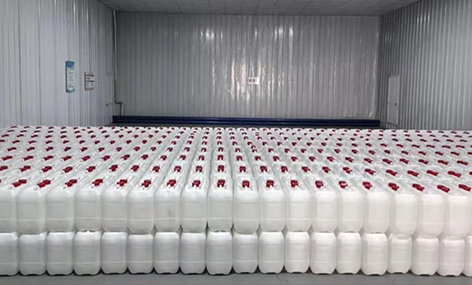
Jul . 28, 2024 17:35 Back to list
High Purity Glacial Acetic Acid 99% Accurate Measurements for Laboratory and Industrial Use
Understanding Glacial Acetic Acid Chemical Properties, Uses, and Safety Considerations
Glacial acetic acid, often referred to as acetic acid in its purest form, is a colorless liquid organic compound with the chemical formula CH₃COOH. It is characterized by its high acidity and is known for its distinct sour taste and pungent smell. The term glacial refers to its ability to form ice-like crystals at lower temperatures (below 16.6 °C or 61.88 °F), thereby indicating its purity. With a concentration of about 99–100%, glacial acetic acid is one of the most concentrated forms of acetic acid available, making it a vital chemical in various industrial and chemical processes.
Chemical Properties
Glacial acetic acid is a weak acid with a pKa value of about 4.76, which means it only partially ionizes in water. This property allows it to be used as a versatile solvent and reagent in chemical reactions. Its high boiling point of approximately 118.1 °C (244.58 °F) and low freezing point make it suitable for various applications, including laboratory use. Upon exposure to the atmosphere, it can absorb water, leading to dilution if not stored properly.
Industrial Applications
The uses of glacial acetic acid are extensive across multiple industries. One of its primary roles is as a chemical precursor in the production of various chemicals. It is utilized to manufacture acetic anhydride and acetate esters, which are widely used in the production of plastics, synthetic fibers, and solvents. Moreover, glacial acetic acid plays an essential role in the textile industry, serving as a dyeing agent and assisting in the synthesis of various dyes.
Another significant application is in the food industry, where acetic acid is used in the production of vinegar, a widely consumed condiment. Although vinegar typically contains only about 4-8% acetic acid, the concentrated form is essential for preserving and flavoring foods. It is also employed in the pharmaceutical sector for drug formulation and as a reagent in numerous chemical reactions.
acetic acid glacial 99 100

In laboratories, glacial acetic acid is used as a solvent, in titrations, and in buffer solutions. Its ability to react with a wide range of compounds also makes it a valuable reagent in organic synthesis.
Safety Considerations
Despite its numerous applications, glacial acetic acid must be handled with care due to its corrosive nature. It can cause severe burns on contact with skin, and inhaling its vapors may lead to respiratory irritation. Consequently, appropriate safety measures should be taken when working with this chemical. Personal protective equipment (PPE) such as gloves, goggles, and lab coats are necessary to minimize exposure.
Proper storage is crucial to maintaining the integrity of glacial acetic acid. It should be kept in tightly sealed containers away from moisture and incompatible substances such as strong bases and oxidizing agents. A well-ventilated area is essential for preventing the build-up of vapors.
Conclusion
Glacial acetic acid is a vital chemical with diverse applications in industry, food, and laboratory settings. Its unique properties and versatility make it an indispensable tool in chemical synthesis and manufacturing. However, awareness of its hazardous nature is crucial for ensuring safe handling and usage. As industries continue to evolve, the demand for glacial acetic acid is likely to remain strong, underscoring its significance in the modern chemical landscape. Understanding its properties, applications, and safety considerations can lead to more effective and responsible use of this essential compound.
-
SmartAgri Solutions - Precision Farming&Soil Monitoring
NewsJul.13,2025
-
Industrial Solutions-Example Inc.|Smart Manufacturing&Energy Efficiency
NewsJul.13,2025
-
Food Grade Glacial Acetic Acid-Pure Quality|High-Purity Acetic Acid,Food-Grade Chemical
NewsJul.13,2025
-
Industrial Efficiency Solutions-NextGen Technologies|Advanced Automation&Data-Driven Analytics
NewsJul.12,2025
-
Smart Manufacturing Solutions-Example.com|Enhance Efficiency&Reduce Costs
NewsJul.12,2025
-
Food grade glacial acetic acid
NewsMar.07,2025
